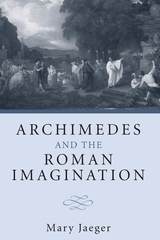
The great mathematician Archimedes, a Sicilian Greek whose machines defended Syracuse against the Romans during the Second Punic War, was killed by a Roman after the city fell, yet it is largely Roman sources, and Greek texts aimed at Roman audiences, that preserve the stories about him. Archimedes' story, Mary Jaeger argues, thus becomes a locus where writers explore the intersection of Greek and Roman culture, and as such it plays an important role in Roman self-definition. Jaeger uses the biography of Archimedes as a hermeneutic tool, providing insight into the construction of the traditional historical narrative about the Roman conquest of the Greek world and the Greek cultural invasion of Rome.
By breaking down the narrative of Archimedes' life and examining how the various anecdotes that comprise it are embedded in their contexts, the book offers fresh readings of passages from both well-known and less-studied authors, including Polybius, Cicero, Livy, Vitruvius, Plutarch, Silius Italicus, Valerius Maximus, Johannes Tzetzes, and Petrarch.

Sofia Kovalevskaia's interest in mathematics was roused at an early age--her attic nursery had been wallpapered with lecture notes for a course on calculus. She spent hours studying the mysterious walls, trying to figure out which page followed from the next. Kovalevskaia (1850-1891) became the only woman mathematician whose name all mathematicians recognize, thanks to her contributions to mathematical analysis. Indeed, she was the first professional woman scientist to win international eminence in any field: the first woman doctorate in mathematics, the first to hold a chair in mathematics, the first to sit on the editorial board of a major scientific journal.
She was also an accomplished writer, a proponent of women's rights and education, a wife and mother in an unconventional marriage, and a champion of radical political causes in Russia and Western Europe--a friend and correspondent of Dostoyevsky, Chekhov, George Eliot, Kropotkin, Helmholtz, and Darwin. This sympathetic portrait of a remarkable woman will appeal to any reader, non-mathematicians and mathematicians alike.

Often referred to as the Newton of France, Pierre Simon Laplace has been called the greatest scientist of the late eighteenth and early nineteenth centuries. He affirmed the stability of the solar system and offered a powerful hypothesis about its origins. A skillful mathematician and popular philosopher, Laplace also did pioneering work on probability theory, in devising a method of inverse probabilities associated with his classic formulation of physical determinism in the universe. With Lavoisier and several younger disciples, he also made decisive advances in chemistry and mathematical physics.
Roger Hahn, who has devoted years to researching Laplace's life, has compiled a rich archive of his scientific correspondence. In this compact biography, also based in part on unpublished private papers, Hahn follows Laplace's journey from would-be priest in the provinces to Parisian academician, popularizer of science during the French Revolution, religious skeptic, and supporter of Napoleon. By the end of his life, Laplace had become a well-rewarded dean of French science.
In this first full-length biography, Hahn illuminates the man in his historical setting. Elegantly written, Pierre Simon Laplace reflects a lifetime of thinking and research by a distinguished historian of science on the fortunes of a singularly important figure in the annals of Enlightenment science.
READERS
Browse our collection.
PUBLISHERS
See BiblioVault's publisher services.
STUDENT SERVICES
Files for college accessibility offices.
UChicago Accessibility Resources
home | accessibility | search | about | contact us
BiblioVault ® 2001 - 2024
The University of Chicago Press









